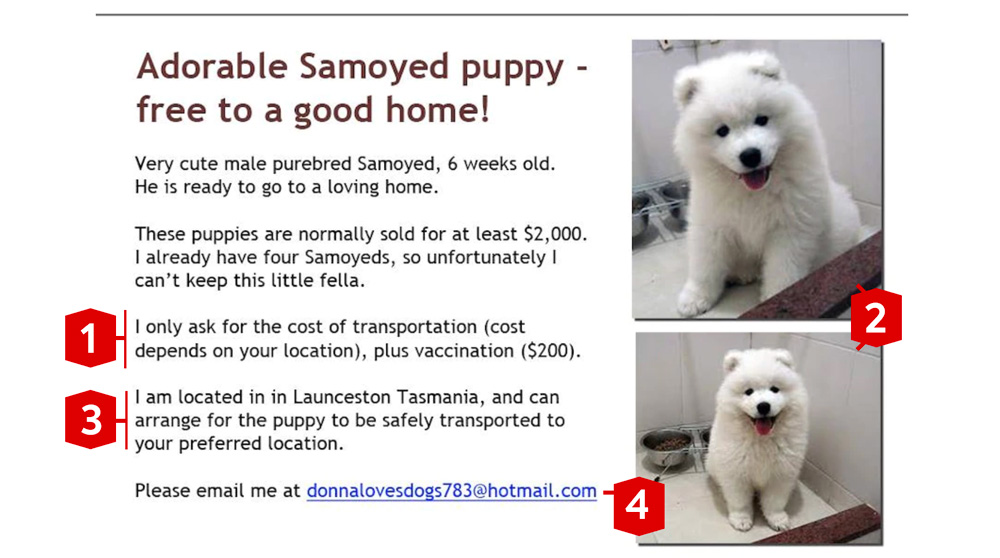
How to Spot a Pet or Puppy Scam Online
May 2, 2022
 By Chris Jackson
By Chris Jackson
Vice President of Retail ServicesYou're scrolling online, and stop when all the sudden you see a cute puppy posted for adoption ... or is it? Sometimes that pet doesn't actually exist.
When the COVID-19 pandemic started to impact daily life in the U.S., many folks who sheltered in place or quarantined at home considered adopting or purchasing a new pet. Unfortunately, scammers also seized the moment, creating their own “puppy scam pandemic” of sorts.
The Better Business Bureau (BBB) reported cases of pet scams tripled in 2020 alone. Today, fake pets account for more than one-third of online scams reported to the BBB. The agency reports that the typical victim loses $700 to a pet scam, and some people lose thousands.
In this article, we'll show you how to spot a pet or puppy scam, along with ways to buy a dog (or other pet) online safely without getting scammed.
How do pet and puppy scams work?
So, how do scammers get away with such criminal activity? They usually publish their puppy scams three different ways:
- Fake websites and website ads.
- Fraudulent listings on places like Craigslist or Ebay.
- Phony Facebook and social media posts.
A post or website might appear credible at first glance. It could include photos of the supposed animal, along with personal details about the pet’s background and story — all with a fairly reasonable price tag.
Example of a puppy scam ad:

Some common flags of a puppy scam include 1) a puppy listed as "free" but other charges apply; 2) puppy photos stolen from other online websites; 3) a seller located far away or out of the country; 4) an email address that has been flagged on scam warning websites. (Source: Consumer Affairs Victoria, Australia)
It might say something like, "the pet is available to a good home for free — if you pay for shipping," a false statement that may end up costing the unsuspecting, would-be pet parent hundreds of dollars. Once a scammer peaks your interest, they'll typically charge for subsequent services over a period of time, under the guise of preparing the animal for shipment. These additional charges might include:
- Extra shipping charges
- A refundable deposit (which the scammer has no intention of refunding), or even a non-refundable deposit
- Adoption fees
- Veterinary bills
- Vaccination costs
- Insurance (including special, pandemic-related insurance)
- Special travel crates and accessories
- Miscellaneous, last-minute costs.
Scammers may even provide fraudulent tracking numbers and travel dates to keep their victim on the hook. They'll withhold key information about the pet, or delay shipment altogether until certain payments are made. During the pandemic, criminals often used health-related cautions as a reason for not meeting face-to-face.
Example of a puppy scam social media post:

Some common flags of a puppy scam social media post include: 1) grammar and punctuation errors; 2) in-demand dog breeds like English Bulldogs, terriers and anything ending in "-oodle" that are common for scammers to use; 3) a photo ripped off from another person's page or profile. (Source: Facebook)
Often, scammers demand payment through gift cards, via wire transfer through Western Union or MoneyGram; or through untraceable cash services like Venmo or CashApp. Then once a victim makes all the requested payments, the pet never arrives and the “seller” ceases all contact.
More examples of common pet scams
Here are some stories of those who have been deceived by pet scams, listed on the BBB's Scam Tracker:
“Bought a puppy to be shipped to me. Sky Pets Shipping wanted insurance for the dog, vaccinations, care and boarding, dog became ill which resulted in a vet bill, dog was injured in a fight which resulted in another vet bill. They said I was responsible for 1/2 of the vet services because that was their policy. I refused to pay, they threatened legal action because I abandoned the dog. I paid this company nearly $16,000.00 for a puppy I never received.”
“Contact emailed and then texted. We were moving & wanted two puppies. They showed us video & photos & asked for a $500 deposit. They then wanted $1000 before sending a contract & arranging shipment. The contract was never signed by me (buyer) & dogs should have arrived 5/24 at 615 pm Huntsville AL airport. I was told the dogs were delayed after I had driven 3 hours. The carrier-skyline customer pet relocation then requested $1200 crate fees, $1350 for insurance and the final straw was $3000 for Covid vaccinations. They claimed the 9 wk old dog would get ...doses (impossible & there is no dog vaccine to date) at once. They tried to play on my guilt & when I started claiming fraud & scam they refused to answer texts or emails.”
“I wanted to buy a Rottweiler puppy and he had gorgeous dogs. He asked all the right questions, sent a contract to be signed along with payment. When came time to fly him over, virgin pets transport sent me an email that the pup needed a specialty crate for a 1500$ deposit. After payment I haven't heard back.”
How to avoid a pet or puppy scammer
If you’re passionate about finding a pet, practice caution and a healthy dose of skepticism! It’s remarkably easy for scammers and cybercriminals to prey on your interests, promising something they won’t deliver, and bilking you out of your money without you realizing what’s happening. Here’s what we recommend when it comes to avoiding online pet scams:
1) Seek out a local breeder, pet shelter or animal rescue organization.
You’ll be able to see the pet in person, meet with staff and/or volunteers, and make sure they're legitimate.
2) Schedule an in-person meetup.
If you don't go local (or even if you do), do everything possible to meet the pet face-to-face before you buy it.
3) Reference a puppy scammer list.
There are dozens of places online that keep up-to-date lists of all the known pet scams in the U.S. One site that the BBB promotes is petscams.com, which tracks complaints, catalogues puppy scams and attempts to get fake pet sales sites taken down.
4) Do your research.
If you’ve got a specific breed or animal in mind, look up the average cost of purchase or adoption first. You’ll also want to take a look at average care costs, like vaccination, veterinary and adoption fees. This will help you flag suspicious sellers if they demand exorbitant costs.
5) Do not pay up front.
Never agree to pay before you actually have the puppy in hand — even if the seller promises to send it to you.
6) Never pay with a gift card, wire transfer or payment app to someone you've never met.
Legitimate businesses and nonprofits would never ask for payment this way, and independent breeders or sellers with credibility should offer different payment methods. To learn more about how to safely use a payment app, read about sending money with Zelle® in the SNB Mobile App.
7) Report pet scams when you see them.
If you spot a pet scam online, tell the Federal Trade Commission (FTC) at ReportFraud.ftc.gov.
Our furry friends play an important (and adorable) role in our lives. Be cautious about where you’re searching for them, and protect your money in the process!
Was this article helpful?
At Security National Bank, we want to provide solutions that matter, when you need them most. Stay up-to-date with the latest scam updates and fraud prevention tips by subscribing to our Security Matters newsletter, and taking our free crash course on identity protection.